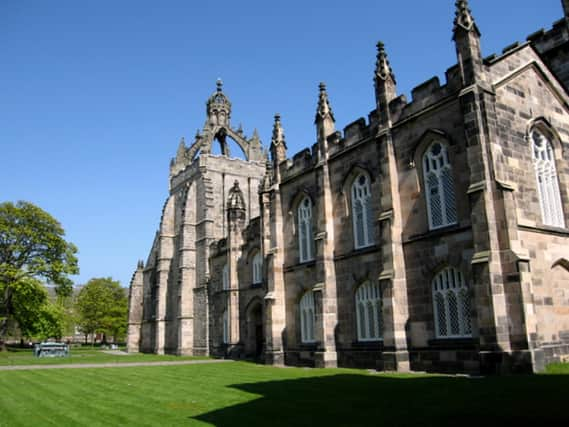Doric to be taught at university to empower form of Scots


Doric, a form of North East Scots that is spoken by 49 per cent of people in Aberdeenshire, will now be taught to undergraduates at Aberdeen University with the course counting towards a student’s degree.
The history of Doric is due to be taught on the course, as well as linguistics, vocabulary and its context in a European setting, with many words and phrases linking Doric with Scandinavian languages, said Dr Thomas McKean, director of Aberdeen University’s Elphinstone Institute which researches and protects the North East’s distinct cultural heritage.
Advertisement
Hide AdAdvertisement
Hide AdHe said: “It’s about building a parity of esteem of the language so that it is thought of in equal terms with other European languages.
“Doric has rules, it has vocabulary and its speakers have a certain way of looking at the world – that goes with any language.
“If you lose any language or lose any aspect of a language, you lose something that is unique.
“The university is an institution of the North East of Scotland so it is important that the language is reflected within the walls of the university. It is important that the university is connected to its region.
“The course is also about taking the language seriously as a cultural asset.”
Doric has a long history in literature, songs and poetry as well as humour, with the hugely popular Scotland The What? comedy show taking the gentle rise out of Doric speakers and their native land, with many of the sketches set in the fictional Aberdeenshire village Aucherturra.
Dr McKean said there was a great tradition of Doric humour but that a “balance needed to be redressed” in order to empower the language.
He said: "Many people associate Doric with humour, and rightly so as there’s a great tradition of self-aware humour here, but if it is only seen through this lens, the power and status of the language is soon undermined.
Advertisement
Hide AdAdvertisement
Hide Ad"Scotland the What? is the best-known example today, but going back to the Music Hall days there’s a strong vein of humorous songs and literature making fun of rustic folks and their way of speaking.
"Dialects become associated with humour and lose currency as languages to be used for ‘serious’ things, like civic life, science, serious media.
"By putting it on the stage at the university, we go some way in redressing the balance.”
Dr McKean said he tried to convince the BBC to do a daily North-East news bulletin in Doric/North-East Scots, but was told ‘you can’t talk about things like funerals or disasters in Doric’.
He added: “This is rubbish, of course, as people, in their homes, do that every single day. The use of dialect as a means of social control goes way back, here and in many cultures. It’s a way of disempowering certain groups – usually rural, ‘unsophisticated’, potentially troublesome groups - and undermining their cultural, economic, and political power.
"An obvious other example is highland dialects of English being used in literature to parodic effect, to make the Highlander appear foolish in the eyes of self-regarding city dwellers.”
He said that, rather than Doric being ‘old fashioned’, it was widely spoken by young people with a study into how Doric is used in social media underway at Banff Academy.
Doric also remained a language of working life for many, he added.
Advertisement
Hide AdAdvertisement
Hide AdDr McKean said: “There are plenty of institutions in which English is not the lingua franca. If you go up to Fraserburgh and Peterhead, you’ll find, for example, electricians from Poland and Lithuania who have school English but who find themselves learning Doric . In their work life, it is what people speak. In plenty walks of life, Doric is useful.”
Aberdeenshire Council has drawn up plans to introduce teaching of Doric in its schools, with the Scots language more generally recognised as an indigenous language of Scotland, a regional or minority language of Europe and as a vulnerable language by UNESCO
A message from the Editor:Thank you for reading this story on our website. While I have your attention, I also have an important request to make of you.With the coronavirus lockdown having a major impact on many of our advertisers - and consequently the revenue we receive - we are more reliant than ever on you taking out a digital subscription.Subscribe to scotsman.com and enjoy unlimited access to Scottish news and information online and on our app. With a digital subscription, you can read more than 5 articles, see fewer ads, enjoy faster load times, and get access to exclusive newsletters and content. Visit https://www.scotsman.com/subscriptions now to sign up.
Our journalism costs money and we rely on advertising, print and digital revenues to help to support them. By supporting us, we are able to support you in providing trusted, fact-checked content for this website.
Joy Yates
Editorial Director